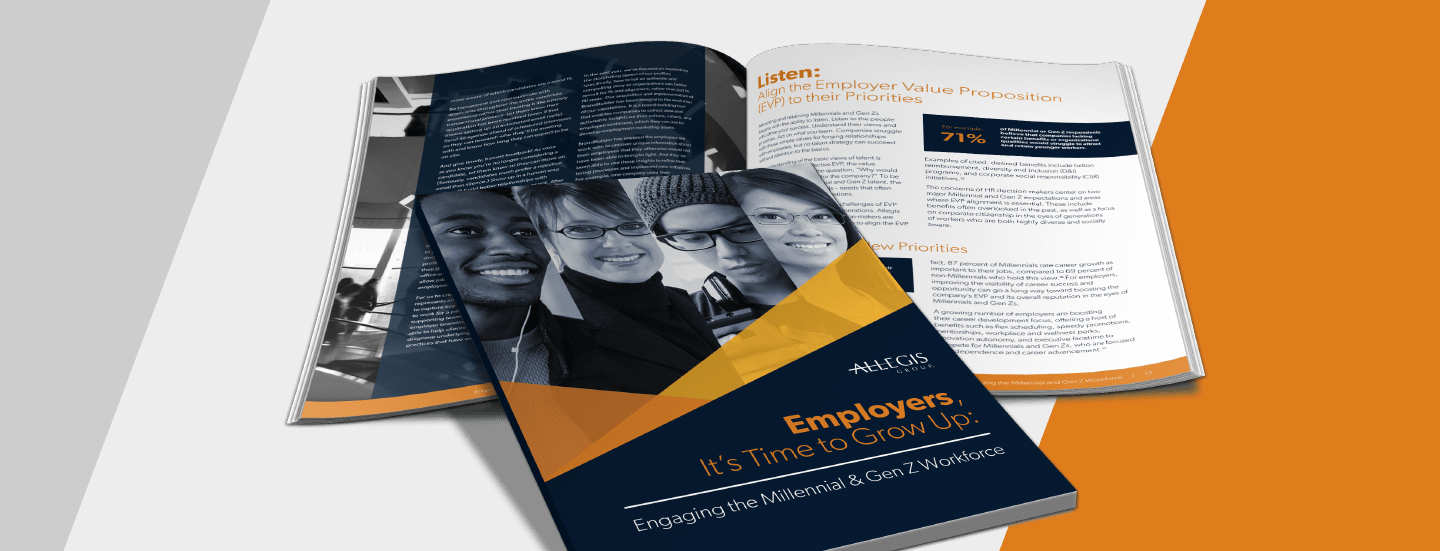Get our New Report on How to Recruit and Retain Millennial and Gen Z Talent

Millennial and Gen Z workers are taking on the workforce, and, in many ways, companies are not adequately prepared to fully attract and engage these generations. What are Millennial and Gen Z workers looking for in an employer? How can companies reshape their talent practices and boost employee success across these generations? Those answers and more can be found in our latest white paper, “Employers, It’s Time to Grow Up: Engaging the Millennial and Gen Z Workforce.”
“Companies’ future success hinges on their ability to forge relationships with Millennials and Gen Zs, who are some of the most capable people in the workforce,” says Andy Hilger, president of Allegis Group. “A talent acquisition approach built on respect and an understanding of the workforce will win today’s battle for talent. That need for understanding applies to recruiting talent of all ages, and we are pleased to shed light on the discussion.”
Survey Reveals Companies Struggle to Attract, Retain and Engage Millennials and Gen Zs
As a part of our research for the report, we surveyed more than 1,000 human resources (HR) decision-makers. Results show that 49 percent of respondents are concerned with their organizations’ ability to attract and retain Millennials and Gen Zs. Another 62 percent believe that issues with attracting and retaining Millennials and Gen Z may lead to a negative business impact, such as slow company growth, limitations on productivity, obstacles to achieving business goals, curbs on innovation, and costly hiring cycles.
Although HR decision-makers express concerns about their organizations’ inability to recruit and retain employees from these generations, few are actually taking action to improve their results. According to an Allegis Group survey, 71 percent believe outdated work practices, unclear career paths, or limited advancements, skills development, or mentoring would result in Millennials and Gen Zs leaving their organizations. Sixty-nine percent struggle to provide incentives that Millennials and Gen Zs want, such as innovation autonomy, executive facetime, mentorships, fast access to promotions, flex scheduling, and wellness programs. Lastly, 31 percent of HR decision-makers say that their companies struggle to create the collaborative culture needed to drive engagement among Millennial and Gen Z workers.
Compensation Isn’t Everything
The report also examines what Millennials and Gen Zs want beyond salary. For example, our research finds that many employees in these generations would take a pay cut to work for a more socially responsible company. And because these generations are more diverse than those who came before them, they also seek an employer that’s committed to fostering an inclusive workforce.
Among surveyed HR decision-makers with established diversity and inclusion (D&I) programs, only 12 percent believe their programs help them to attract Millennial and Gen Z talent, and only 17 percent consider D&I a key part of their employee value proposition (EVP). Survey respondents with corporate social responsibility (CSR) programs in place also revealed that only 13 percent believe their CSR efforts help them attract Millennial and Gen Z talent, and only 16 percent consider CSR a key part of their EVP. The report offers strategies for how to drive impactful CSR and D&I initiatives that will help them better compete for top talent.
“Millennial and Gen Z populations are reshaping the global workforce,” adds Hilger. “Considering their numbers, their skills, and the concerns companies have about attracting them, tapping these generations is both a priority and a challenge. This white paper provides data and best practices to help employers mature their talent practices and deliver an enriching talent journey that can lead the next generation of workers to their vision of success in work and in life.”
Download your free copy of Allegis Group’s “Employers, It’s Time to Grow Up: Engaging the Millennial and Gen Z Workforce” report today.


